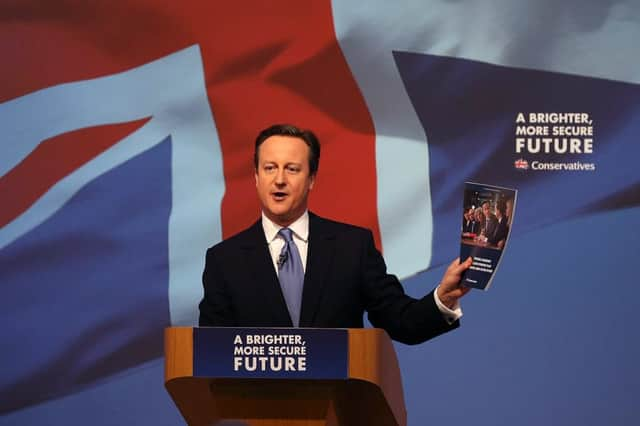Leaders: Battle for the centre could backfire


Earlier in the week Ed Miliband signalled a strategy switch with the launch of the Labour manifesto when he played down the quest for social justice that has dominated their campaign thus far and sought to steal the Tory clothes on safe stewardship of the economy. In a bid to tackle head-on their greatest electoral weakness, Labour eschewed any unfunded spending, although exactly where the cuts are coming from we do not know.
Then at the launch of the Tory manifesto Mr Cameron held his party out as that of the working people. With echoes of post-war electioneering he promised the British people the good life.
Advertisement
Hide AdAdvertisement
Hide AdThere were a number of policies squarely aimed at countering the much-repeated Labour claim that they are the party for the rich as they unveiled an extension of the right to buy, a doubling of free childcare (both in England only) and a promise that tax allowances will rise to ensure the minimum wage is tax-free.
Mr Cameron obviously sought to play on the economic recovery seen under the coalition government, which he knows is his trump card. He said he wanted to expand on this and build on it and then announced the very opposite of what Labour had promised by laying out unfunded spending pledges. Mr Cameron did not spell out who will pay, which cuts the Tories will make or which taxes they will raise.
So here we see a graphic demonstration of just how unpredictable this election is. Neither of the main parties have held their nerve on their broad strategic lines, and instead have gone on the defensive by trying to meet what they see as the deficiencies so far. That movement only signals how close they are in the polls, and how desperate they are to take as much centre ground as possible.
What no-one knows is how voters will react to this lack of confidence and desperation to appeal to be all things to all people. It might change some voters’ minds, but the more probable reaction will be one of disaffection with politicians on the make.
And given how tight it is, and how every vote is a battleground, it seems surprisingly self-defeating for Mr Cameron to say Britain in 2010 was “a debt-addicted, welfare-burdened, steadily declining, once-great nation”.
That surely is a picture of the United Kingdom that few people would recognise as a fair representation of all that was going on in these islands even at a time of great economic hardship.
So it remains to be seen how the strange swapping of political positions will fare for the two main parties, and just who will be left with a smile like that of the Cheshire cat.
GPs’ situation must be improved
The figures the BMA have generated from their survey of general practioners are indeed concerning, but hopefully there is still time to put in place measures that will avoid any major breakdowns in service.
Advertisement
Hide AdAdvertisement
Hide AdGPs are in the frontline of healthcare and it is a difficult and demanding job that probably is now seen as being less attractive for the newly qualified doctor than it was a generation ago.
But within the figures there are perhaps elements that make them less shocking. Yes, a third of GPs said they plan to retire, but that is over the next five years, there is time to replace them. Secondly, that may not be anything like such a strong comment on the job as it appears, but in fact may be more to do with the demographics of those currently in general practice. And doesn’t the fact that they are working to retirement age and not leaving in droves for less stressful jobs or specialisations amount to a vote of satisfaction with the role?
Yes, four out of five GPs said that they experienced significant levels of work-related stress, but 70 per cent of those felt it was manageable.
There can be no doubt of the value that the role of general practioner plays in our healthcare system. And there can be no doubt that steps need to be taken to address the findings of the BMA report – but this is not a time for panic.
More must be done to extol the benefits of the life to those in medical schools to make it more attractive to those graduating, but also more must be done in terms of cutting the bureaucracy that can be the bane of it, and looking at the issues of hours and workloads to reduce the pressures that are all too real.
FOLLOW US
SCOTSMAN TABLET AND MOBILE APPS